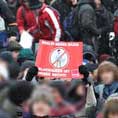




 (the past tense of ¡No pasarán!) – a report from the blockades against the Nazi demonstration on February 13 in Dresden
(the past tense of ¡No pasarán!) – a report from the blockades against the Nazi demonstration on February 13 in Dresden
They didn’t pass! The planned Nazi demonstration on February 13 in Dresden was blocked by more than 10,000 people. At 5 o’clock that morning, 25 fully-loaded buses set off from Berlin to go to the blockades – all in all, more than 100 buses from across Germany and neighboring countries arrived in Dresden.
The bourgeois press claimed that a human chain organized by the mayor of Dresden had stopped the Nazis – but in reality, this chain was miles away, on the other side of the Elbe river! What really mattered was the organized and resolute action by the blockaders, who first significantly delayed the arrival of the Nazis and then literally penned in nearly 7,000 of them who had gathered at the Neustadt train station.
Like the Trotskyist Holger Burner rapped in a mobilization clip on Youtube, it was a bit like Stalingrad 2.0: for example there were the low – albeit not quite so bitterly cold – temperatures on this winter day, in which the blockaders endured for eight hours and longer. But these ordeals were quickly forgotten after the final success. There was an exuberant mood on the ensuing parade through the Neustadt district to the central square Albertplatz.
What lessons should we draw from this day?
In the struggle against fascism, the mobilization of a critical mass is essential. If the people who are directly threatened by fascism – i.e., leftist youth, immigrants and the workers‘ movement – fight together side by side, then the Nazis have no chance. This year it was possible to mobilize far more than the ”Antifa” scene to the blockades: even if most of the blockaders were young, Martin, who works as a nurse in a Dresden hospital, reported that he met many of his colleagues at the biggest blockade at the Albertplatz.
It was only for this reason that the repressive apparatus of the state had to yield, involuntarily, to the active protests. If in the future we succeed to mobilize broader masses, especially of workers, the the state will have even fewer options: if it clears the way for the brown hordes by force, it will become clear to the very last person whose side it is really on.
After their failed demonstration, hundreds of Nazis rioted in Pirna, Gera and other cities – among other things, they attacked an office of the SPD, which shows once again that the Nazis are arch-enemies of any workers’ organization, no matter how moderate. This also shows that we can not rely on the state: in order to protect ourselves from Nazis, we have to fan the forge ourselves (i.e. we have to do it ourselves)! To this end, we need our own self-defense groups that can protect our meetings, buildings, demonstrations and parties. Then our busses won’t need a police escort, which claims to protect us – just to stop and search us in the next moment.
All in all, the tactic of stopping the with Nazis by peaceful blockades was a complete success – but it should not be forgotten that at times the police brutally attacked smaller blockades, for example using water cannons against them at temperatures around 0 degrees celsius.
But this blockade concept is no panacea. The situation won’t always remain as peaceful as it was this year in Dresden (at least from the protesters’ side). This time it was convenient for the police to defend the “democratic” image of the city of Dresden by not unleashing their full potential for violence against 10,000 blockaders.
But the police usually act quite differently in other situations, for example against students, squatters and also against striking workers. Furthermore, the police trivialize Nazi violence against their enemies again and again. Next year, when the Nazis want to organize a “star march”, other forms of resistance have to be considered. If they are discussed, agreed upon and coordinated in advance as well as this year, then next year the Nazis won’t get through either!
Comrades of RIO, the Revolutionary Internationalist Organization from Dresden, Berlin, Kiel, Zurich and Prague participated in the blockades – unfortunately on different ones, since the police closed off the entire city and even blocked the bridges. We distributed nearly 1,000 copies of our new newspaper, which explains the connection between fascism and capitalism, and mobilized for a public meeting on February 20 in Dresden.
by David, Berlin, February 17, 2010
2 Responses to “¡No pasaron!”
Leave a Reply

March 1st, 2010 at 16:19
also been published here:
http://www.permanentrevolution.net/entry/2977
March 18th, 2010 at 23:32
and in the new issue of the journal “Permanent Revolution”